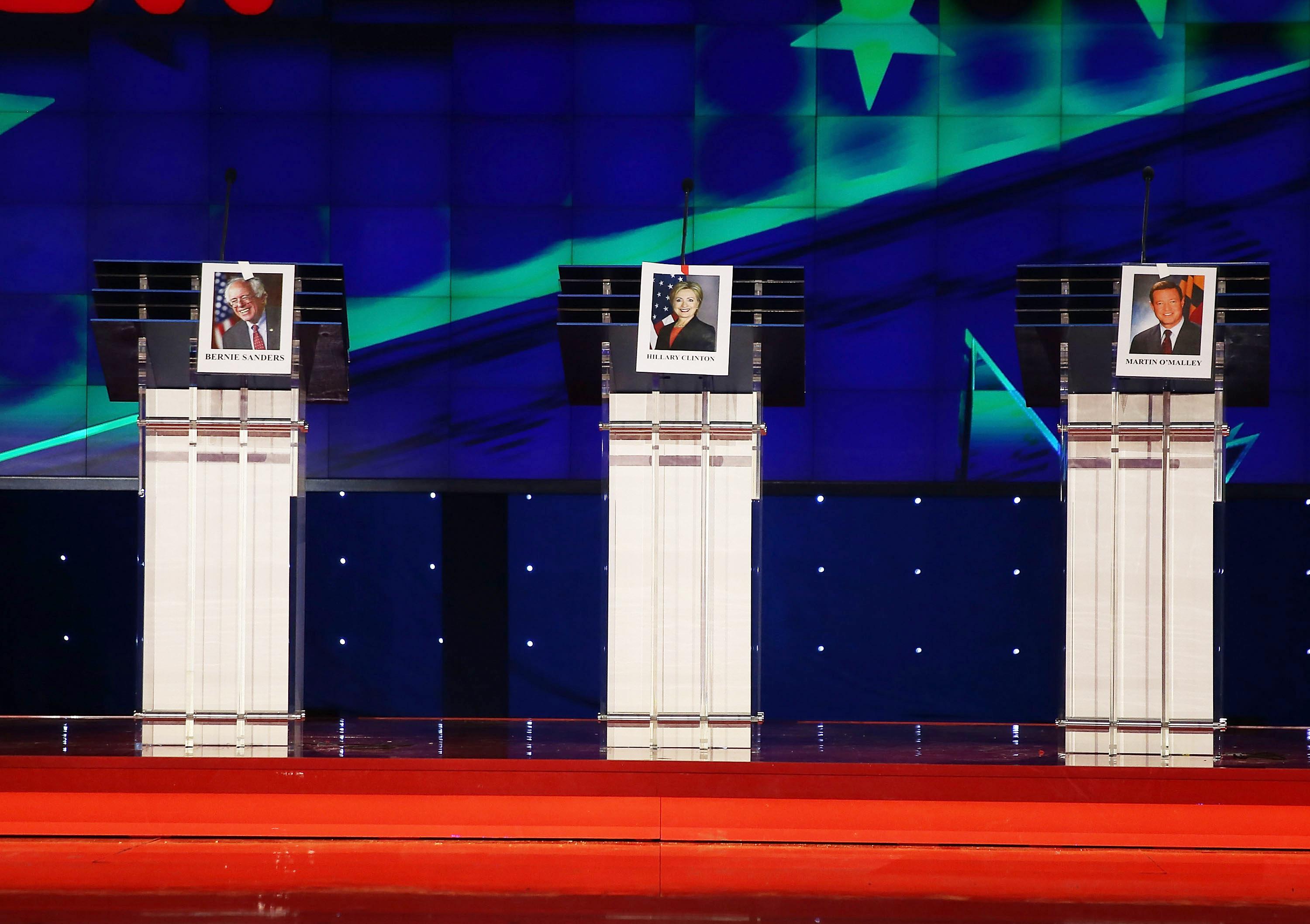Ding, ding: Round 1. The Democratic presidential contenders are in Las Vegas on Tuesday for their party’s first primary debate of the year. Hillary Clinton will be standing center stage, flanked by Vermont Sen. Bernie Sanders and former Maryland Gov. Martin O’Malley. Former Rhode Island Gov. Lincoln Chafee and former Virginia Sen. Jim Webb, meanwhile, will take their positions toward the edges of the stage, where they are much more likely to serve as props than potential spoilers. Missing in action will be one non-candidate CNN executives desperately wanted to be there (Joe Biden) and one quasi-known declared candidate that didn’t make the network’s cut (Lawrence Lessig).
A quick rundown of what you need to know and what to watch out for:
Not Your (Republican) Father’s Debate
The first two rounds of GOP debates will have some viewers tuning in expecting blood. That, though, is unlikely to happen given the Donald Trump-less dynamics of a Democratic field that includes one overwhelming front-runner and four other candidates who will be introducing themselves to many potential voters for the first time.
Expect plenty of policy disagreement but little in the way of brash personal attacks we saw from Republicans in Cleveland and Simi Valley. As the top two candidates on stage, Hillary and Bernie will set the tone for the night, and neither are expected to come out swinging: Clinton doesn’t want to look desperate, and Sanders doesn’t do negative. As a one-time dark horse now lost in polling asterisk territory, meanwhile, O’Malley has the most incentive to gamble by going on the offensive against Clinton—but doing so will take some creativity from a man who spent much of the 2008 campaign singing her praises.
Where Hillary’s Most Vulnerable
Clinton’s potential problem areas are, by this point, well known: her private email, her ties to Wall Street, her Iraq War vote, and her general trustworthiness. The topic that could cause her the biggest headache in Nevada, though, may be the Trans-Pacific Partnership, the trade deal loathed by unions that she once called the “gold standard in trade agreements” but, conveniently enough, recently decided she no longer supports.
Where Bernie’s Most Vulnerable
Guns. One of the rare blemishes on Sanders’ progressive resume is a voting record that doesn’t look nearly as sparkling as the gun-control crowd would prefer. While his pro-hunting positions are a little more nuanced than they might appear, he’ll have a tough time explaining his 2005 vote to shield gunmakers and dealers from lawsuits. Even if Clinton doesn’t hit him on the topic, she’s already laid the groundwork for the moderators to do it for her: Among the suite of gun control regulations she cleverly unveiled earlier this month was one that would repeal that law.
What Winning Looks Like For Hillary
As the front-runner, Clinton will be happy to hold serve. Given her massive fundraising and organizational advantages—not to mention current polling lead—Tuesday night is all about minimizing risk and looking presidential for the former secretary of state. She only needs to be solid, not stellar. That won’t be enough to win the debate as far as the press corps is concerned, but it will keep her on pace to win something much more important: her party’s nomination.
What Winning Looks Like For Bernie
Sanders is probably best positioned to make a splash in Las Vegas, but like Clinton he’d also be well served by keeping things simple. The primetime debate presents Sanders with an opportunity to reach millions of Democratic voters who have not yet gotten a first-hand look at the man who proudly calls himself a “democratic socialist.” And if there’s one-thing Bernie’s insurgent campaign has taught us so far, it’s that when a certain type of progressive voter sees him up close (read: white males), they tend to like what they see.
What Winning Looks Like For Everyone Else
Voters remembering their names come Wednesday morning.
